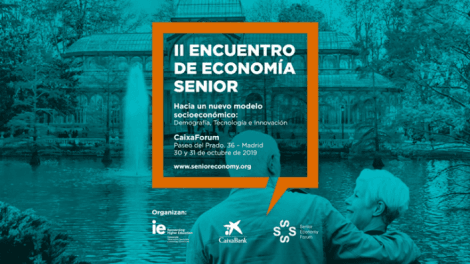- Home
- News And Events
- News
- The Senior Economy Forum, Ie Foundation And Caixabank Organize The Ii Senior Economy Meeting
The Senior Economy Forum, IE Foundation and Caixabank organize the II Senior Economy Meeting
The role of the senior population is incresing in importance.

The organizers of the event presented the objectives of the meeting at a round table chaired by Benigno Lacort, CEO Senior Economy Forum; Rafel Puyol, Director of the Observatory of Demography and Generational Diversity of the IE Foundation; Beatriz Dorado, Director of Family Senior at Caixa Bank; Carlos Mas, Vice President of the IE Foundation; and journalist Manuel Campo Vidal.
The combination of a low birth rate, an aging population and longer life expectancy is narrowing the base of the labor pyramid, prompting Rafael Puyol to point out: “there is a need to cover the deficit of young people in the active population.”
Beatriz Dorado said the data speaks for itself: “In Spain, the average age is now 43, 19% of the population is aged over 65, 6% of the population is already octogenarian and there are more than 16,000 people who are aged over 100.”
She stressed that now people are living longer and healthier lives, we will need to find alternatives to complement pensions. The majority pensioners in Spain receive on average a monthly payment of €1,183 euros. "Some 70% of retirees live solely on a pension, and 40% of them have to manage on less than €700," she added.
Faced with lifespans up to 30 years longer than a couple of generations ago, Dorado highlights the importance of changing our culture and mindset. “The new reality is going to demand greater saving capacity. Aware of the problems many people face in meeting their daily needs, we need an added-value economy that generates employment, along with the existence of financial products that facilitate saving,” she argued.
“We can no longer rely on a job for life.”
At the same time, the senior economy provides an opportunity to develop a high added value economy based largely on culture and creativity, pointed out Benigno Lacort and Carlos Mas, the latter adding that managers need to be aware of this and learn how to adapt to new scenarios. “Companies today are more diverse generationally; but many managers still do not know how to deal with this, or understand how it is affecting them.” Mas said education is the tool that provides the means to face the challenges of the future. "We can no longer rely on a job for life," he argued, adding that managers need to ask employees for new approaches and different forms of training. "These days we carry our knowledge and experience around with us, and this is how seniors will also find opportunities," he concluded.